Table of Contents
1. Super Senses
Has this ever happened to you?
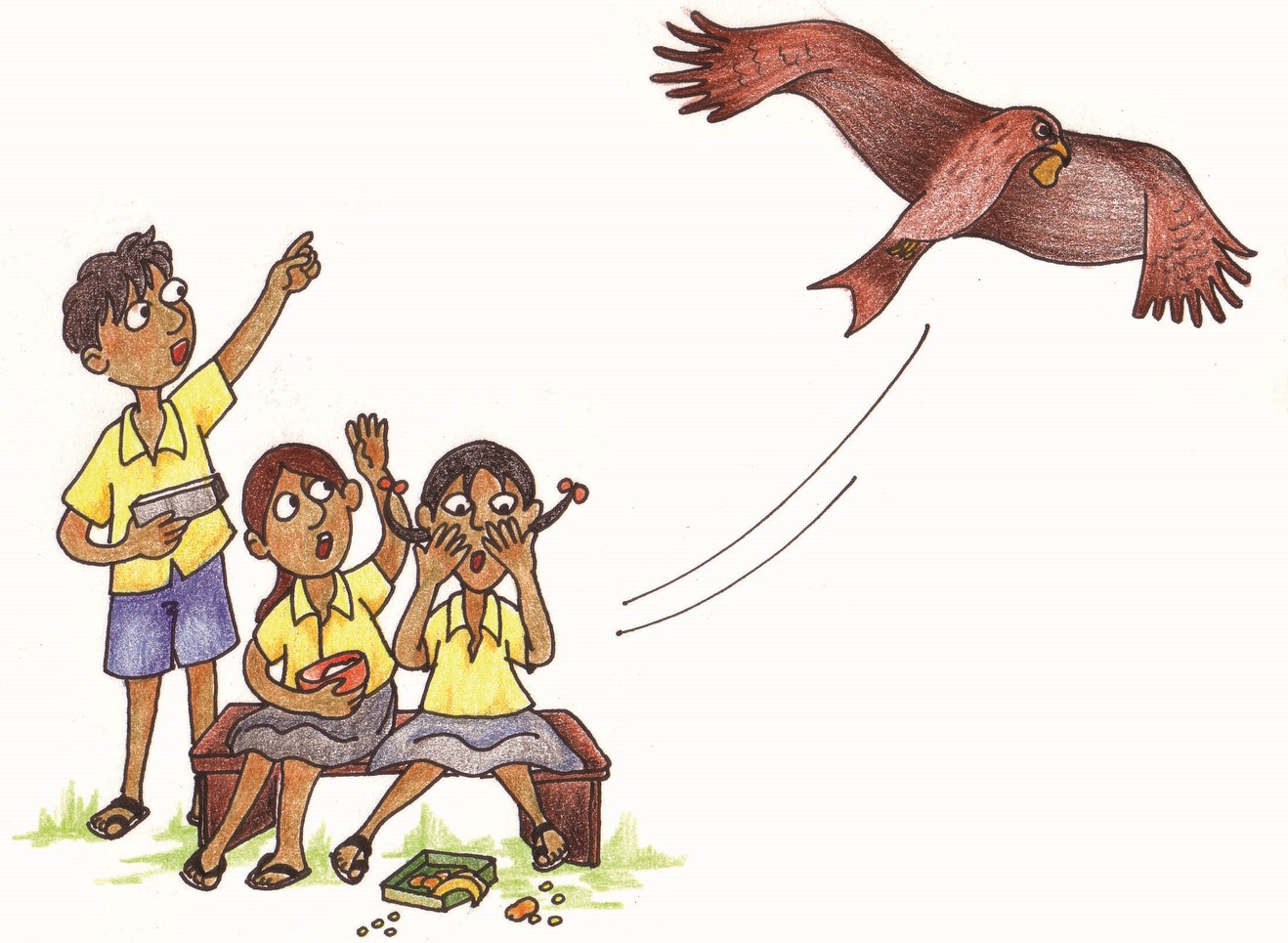
You were eating in the playground, an eagle flew down and took away your roti.
You dropped something sweet on the ground and within minutes many ants collected around it.
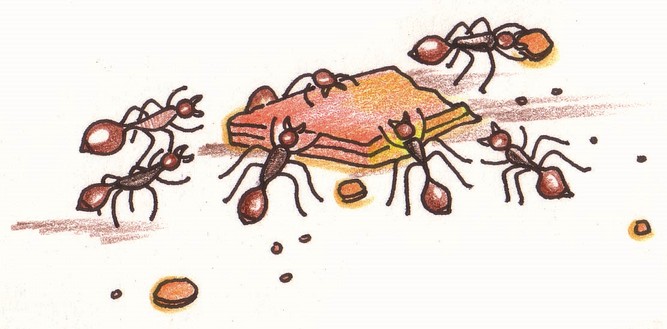
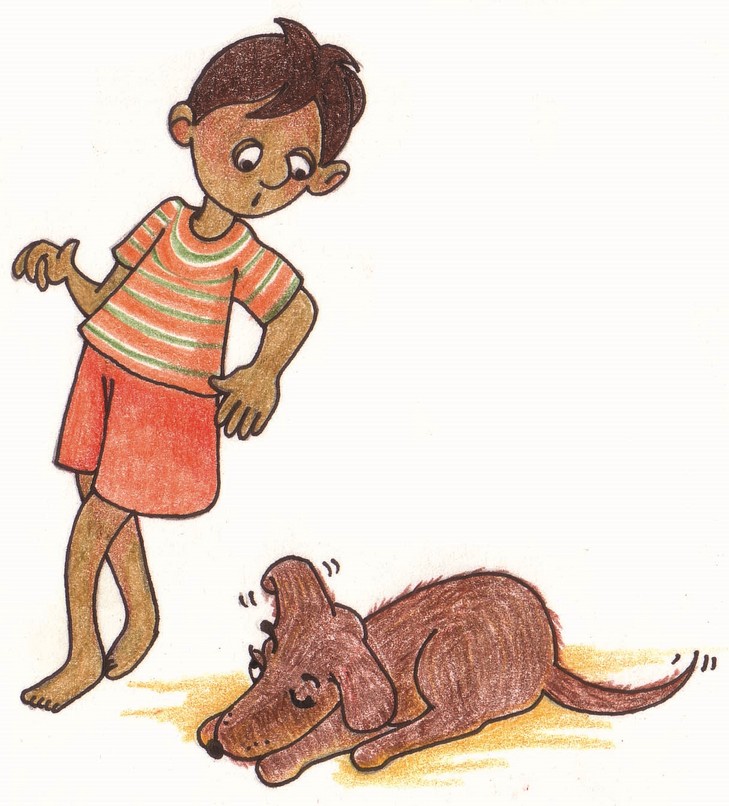
As you walked softly past a sleeping dog, its ears shot up at once.
Why does it happen? Think and tell
Animals also have different senses. They can see, hear, taste, smell and feel. Some animals can see their prey from
far away. Some can hear even the faintest sound. Some animals can find their friends by their smell. The animal world is full of examples of amazing senses!
How did the ant recognise a friend?
An ant was going along on the ground. It saw a group of ants coming from the other side. The first ant quickly came back to its hole. The ant guarding the hole recognised it and let it in.
Think and Tell
- How did the ant know that the other ants were not from its group?
- How did the guard ant recognise this ant?
Try this and write
Drop some sugar, jaggery or anything sweet on the ground.
Wait until the ants come there.
- How long did it take for the ants to come?
____________________________________________________
- Did one ant come first or a group of ants came together?
- What did the ants do with the food?
____________________________________________________
- Where do they go from there?
- Do they move in a line?
____________________________________________________
Teacher’s Note: Children of this age are interested in animals. Encourage them to share their experiences. Children should be supported to carry out observation activities which require patience.
Now carefully, without harming the ants, block their path for a while with a pencil.
- Now observe, how do the ants move?
____________________________________________________
Many years ago a scientist did many experiments like this.
He found out that as the ants move, they leave a smell on the ground. The other ants follow the smell to find the way.
- Now can you guess why the ants behaved like that when you blocked their path?
Some male insects can recognise their females by their smell.
- Have you ever been troubled by mosquitoes?
Just think, how do they know where you are?
Mosquitoes can find you by the smell of your body. They also find you by the smell of the sole of your feet and the heat of your body.
I am a silk worm. I can find my female worm from many kilometres away by her smell.
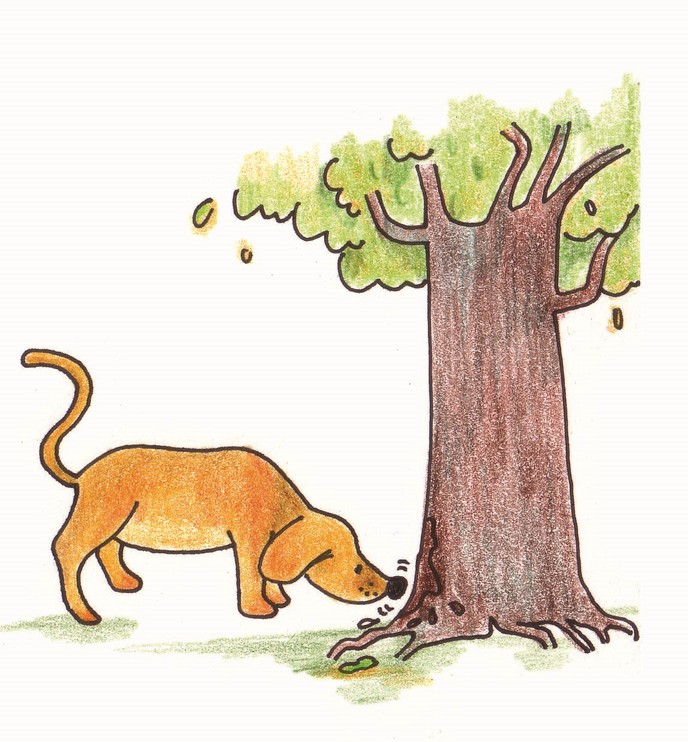
- Have you seen a dog sniffing here and there? What do you think it is trying to smell?
Dogs mark out their own area on the road. They can make out if another dog has come into their area by the smell of its urine or potty (latrine).
Write
- In what ways do human beings make use of this special sense of smell of dogs?
____________________________________________________
- When do you find your sense of smell helpful to you? List some examples. Like–to know by its smell that food has gone bad or that something is burning.
- Name the animals that you would be able to recognise only by their smell, without seeing them?
- Write the names of five things whose smell you like and five things whose smell you do not like.
I like the smell of | I do not like the smell of |
|
|
|
|
|
|
|
|
|

- Do you and your friends have similar answers?
Discuss
- Do the clothes of any of your family members smell?
whose?
- Did you ever come across any smell in a crowded place such as a fair, bus, train etc.
Why so?
Today Rajni had to go out for some important work. She had to leave her sixmonth old son Deepak with her sister Sushila. Sushila also has a baby of the same age. It was funny that both the babies did potty at the same time. She happily cleaned her daughter but when she was cleaning her sister’s son Deepak, she covered her nose with her dupatta (scarf).

Think and discuss
- Sushila covered her nose when she cleaned Deepak’s nappy, but not when she cleaned her daughter. Why do you think she did this?
- How do you feel when you walk near a heap of garbage?
Think of the children who spend the whole day picking things from such garbage.
- Is a smell ‘good’ or ‘bad’ for everyone in the same way? Or does it depend on how each one feels about it?
Teacher’s Note: Sushila’s example illustrates a common situation in families. Discuss with children how we often find a smell ‘bad’ when we think it is from something dirty. If we analyse it, we may not be so offended by certain smells.
Let’s see
- Write the name of a bird which has eyes in front of its head (like in humans).
- Write the names of some birds which have eyes on either side of the head. What is the size of their eyes as compared to the size of their head?
Most of the birds have their eyes on either side of the head.
Their eyes can focus on two different things at a time. When they look straight ahead, both their eyes focus on the same object.
You must have seen birds moving their neck very often. Do you know why? In most of the birds, eyes are fixed and cannot move. So birds have to turn their heads to see around.

Looking with one or both eyes
Close your right eye or cover it with your hand. Tell your friend to stand to your right, at some distance, and ask him to do some action (wave hand, shake head, etc.)
- Could you see your friend’s action, without moving your neck?
- Now try to look at your friend’s action with both your eyes open but without moving your neck.
- What was the difference on looking with one or both eyes?
Teacher’s Note: When a bird focuses both eyes on an object, it can estimate the distance. When its eyes focus on two different things, it increases its range of vision. Children will understand this better, once they start observing the location of eyes of different birds. While seeing with one eye and then with two eyes, children will understand how with two eyes, the span of vision increases.
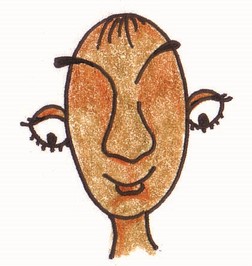
- Now toss a small ball or a coin and try to catch it. Try this with both your eyes open. Then close one eye and try to catch it. When was it easier to catch?
- Imagine how it would be to have your eyes in place of your ears? What would you be able to do then, which you cannot do now?
Some birds like kites, eagles, vultures can see four times
as far as we can. These birds can see things from a distance
of eight metres what we can see from a distance of two metres.
- Now can you guess from what distance can an eagle in the sky can see a roti on the ground?
Do animals see colours?
Animals cannot see as many colours as we can. See how things in these pictures will be seen by some animals.
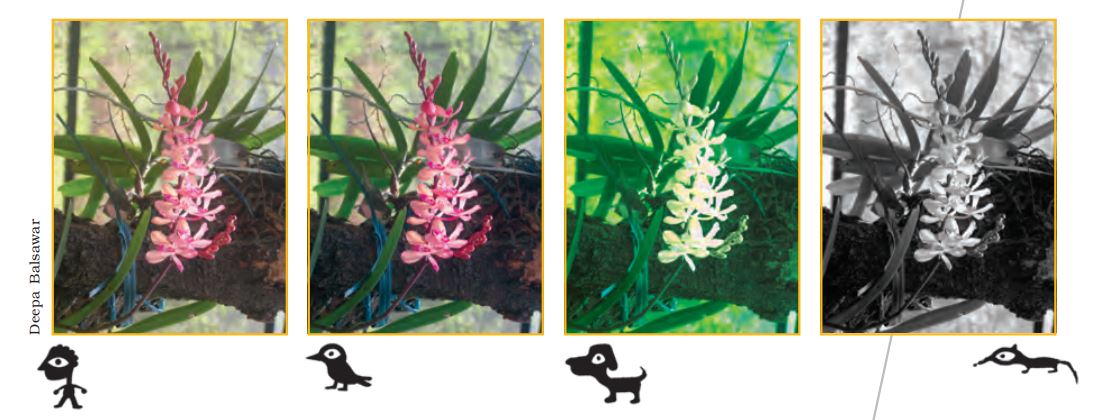
It is believed that animals that are awake in the daytime can see some colours. Those animals that are awake at night can see things only in black and white colours.

Sharp ear
In Class IV, you read that we cannot easily see birds’ ears. Their ears are small holes covered with feathers.
Write
- The names of ten animals whose ears can be seen.
- The names of some animals whose ears are bigger than our ears.
Think
- Is there some link between the size of animals’ ears and their hearing?
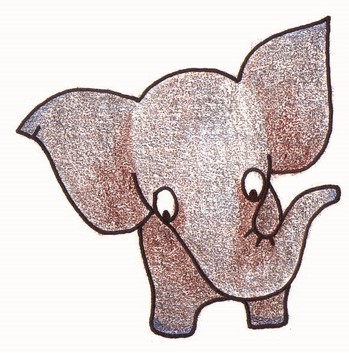
Try this
For this activity find a quiet place in your school.
Tell one of your friends to stand at a short distance and ask him to say something softly.
The rest of you should listen carefully. Then all of you put your hands behind your ears, as shown in the picture. Let the same child say something again as softly as before. In which case was the sound sharper? Ask your friends too.
- Put your hands over your ears and say something. Can you hear your own voice?

- Sit near a desk. Tap the desk once with your hand. Listen carefully. Now put your ear on the desk as shown in the picture.
Tap on the desk once again with your hand. Listen again. Was there any difference in the sound of the tap?

This is how snakes hear. They do not have external ears (which you can see). They only feel the vibrations on the ground.
Sounds send messages
- High up on a tree, a langur warns others of dangers like a tiger or leopard. The langur does this by making a special warning call.
- Birds also give alarm calls to warn about the danger. Some birds even have different sounds for different kinds of dangers. For example, there is a different warning call if the enemy is coming from the sky or if the enemy is on the ground.
- Fishes give alarm call by electric signals.

Some animals start behaving in a different way when an earthquake or storm is about to come. People who live in forests and can observe such behaviour of animals come to know of the danger.
In December 2004, few tribes that live in the forests of the Andaman Islands noticed the animals behaving in a different manner. They guessed some danger. So they moved away to a safer part of the island. Soon after, the islands were hit by the tsunami but these people were saved.
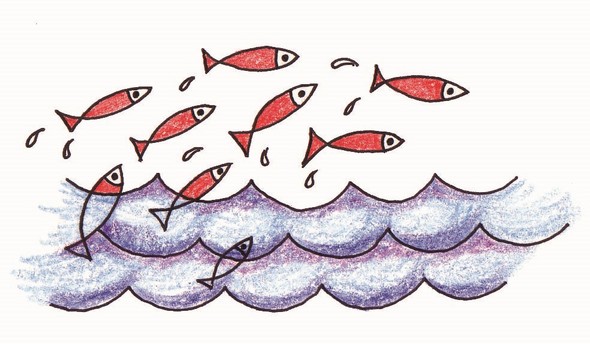
Dolphins also make different sounds to give messages to each other. Scientists believe that many animals have a special language of their own.

Write
- Can you understand the sounds of some animals?
Which animals?
- Do some animals understand your language?
Which ones?
Say it with sounds
Just like birds and dolphins you can also make your own language of sounds for giving messages. Remember you have to talk to your friends with only sounds and no words. How and when will you need to give an alarm call? For example, when the teacher is coming to the classroom!
Sleeping-waking
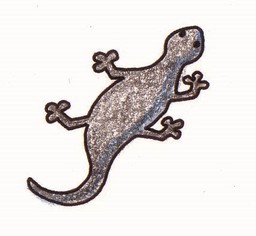
Some animals go into a long, deep sleep in certain seasons.
Then they are not seen for many months.
- Have you noticed that during the cold season you cannot see any lizard in the house? Where do you think they have gone?
Teacher’s Note: The lesson gives examples of several animals with ‘sensitive’ senses. Encourage children to find out more such animal senses from newspapers, TV programmes, etc.
Sloth
It looks like a bear but is not. It is a sloth. It spends almost 17 hours a day sleeping while hanging upside down on a tree branch. The sloth eats the leaves of the same tree on which it lives.
It hardly needs anything else. When it has eaten enough leaves from that tree, it moves to the nearby tree.
Sloths live for about 40 years and in that time they move around only eight trees. Once a week it comes down from the tree to relieve itself.
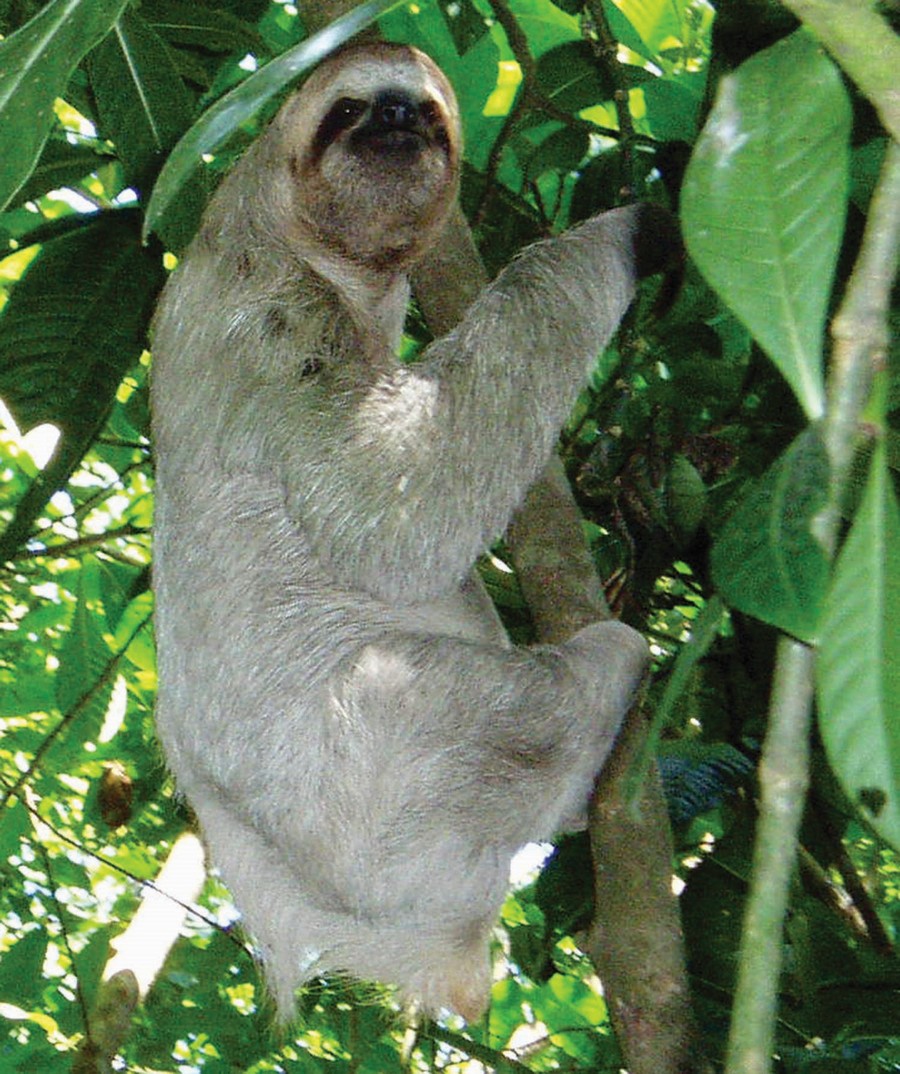

If you were to show a sloth’s daily routine (sleeping and waking) in a 24-hour clock, this is what the clock would look like.
How will you show the clock for a house-lizard in winters?
Given here is the sleeping time of some animals. Write below each picture for how many hours a day that animal sleeps.

- When you see different animals, do you have any questions about them? Make a list of ten such questions.
Teacher’s Note: The sleeping and waking routine of animals is given in a 24 hour clock to encourage children to think about fractions (one-third, one-fourth, etc.)
Explain phrases like ‘call of nature’, ‘relieve itself ’ etc.

A tiger can see six times better at night than most of us.
The tiger’s whiskers are very sensitive and can sense the movements or vibrations in air. They help the tiger move in the dark and find its prey.
A tiger’s sense of hearing is so sharp that it can make out the difference between the rustling of leaves and the sound of an animal moving on the grass. The ears of the tiger can move in different directions and this helps to catch the sounds from all around.
Tigers make different sounds for different purposes like when it is angry or to call out to a tigress. It can also roar or snarl. It’s roar can be heard upto 3 kilometres away.
Each tiger has its own area which may cover several kilometres. Tigers mark their area with their urine. A tiger can at once come to know if there is another tiger in its area by the smell of the urine. A tiger will avoid going into another tiger’s area.
The tiger is one of the most alert animals. And yet, today tigers are in danger.
- What do you think are some of the dangers to tigers in the jungle?
- Can human beings also be a threat to animals? How?
Do you know that today many animals are killed and their parts are sold? Elephants are killed for their tusks, rhinoceros for its horn, tigers, crocodiles and snakes for their skins. Musk deer are killed just to make a little scent from its musk.
People who kill animals are called hunters and poachers.
The number of tigers and many other animals in our country is reducing.
There is a danger that some of them will soon disappear. To protect the animals, our government has made some forests as protected areas. Some of them are the Jim Corbett National Park in Uttrakhand and ‘Ghana’ in Bharatpur district of Rajasthan. In these areas nobody can hunt animals or destroy the jungle.
Find out
- Where are other such National Parks in India?
- Collect information on these and write a report.
What we have learnt
- Have you noticed that sometimes singers put their hand on their ear when they sing?
Why do you think they may be doing this?
- Give examples of animals that may have a very strong sense of sight, hearing or smell.
Teacher’s Note: Discuss with children the various threats to the tiger–poaching, destruction of forests for roads, dams, human settlements, forest fires, etc.

Let’s make a paper dog
For this you need: thick paper, pencil, scissors, sketch pen.
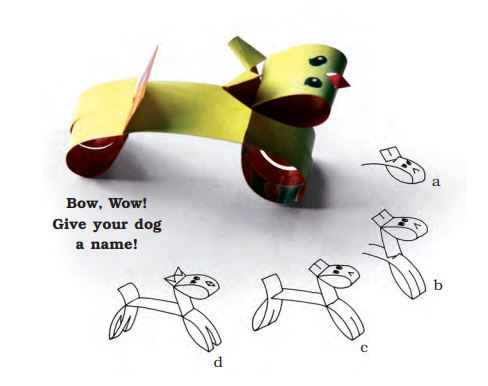
- Cut a long strip of thick paper. Mark the strip as shown here.
- Make small cuts on the lines marked 1 to 6.
- Hook together the cuts on the number 1 and 2 (see picture a).
- In the same way, hook together 3 in 4, and 5 in 6 (see picture b and c)
- Make a cut in the mark on the leg (see picture c).
- Turn down the corners of the strip on top of the head, to make the ears (picture d)
- Mark the eyes and nose with a sketch pen. Wasn’t that fun!
